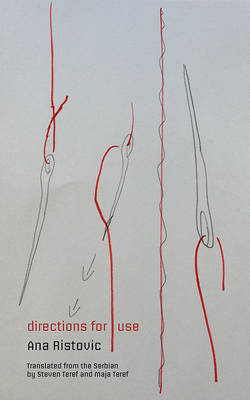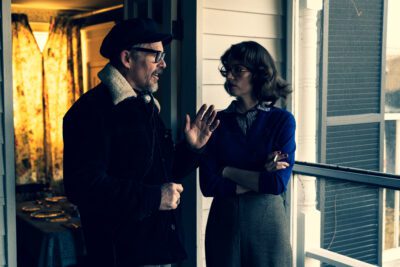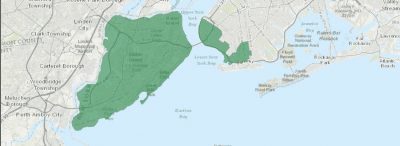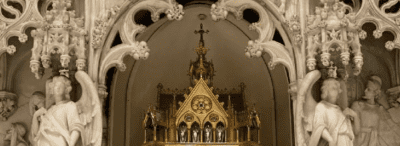Interview with 2018 NBCC Poetry Award Finalist Ana Ristović
For the past four years, the National Book Critics Circle has partnered with The New School’s MFA Creative Writing program, allowing the students to interview each of the NBCC Awards Finalists. In addition to building excitement for the Awards Finalist Reading and Ceremony held at the New School March 14th-15th, these interviews have built an intergenerational bridge between the writers of today and tomorrow.
This year, as part of the ongoing collaboration, and in support of the NBCC’s conversation about reading, criticism, and literature that extends from the local to the national, Brooklyn Magazine will publish and promote the interviews between NBCC Finalists and the current students of The New School.

The Serbian poet Ana Ristović’s poetry is unusually alive, mainly because it feels as though she herself is buzzing inside of each line. Her poems are erotic, effervescent, and hyper articulate. They light up and give life to parts of existence writers often forget to make room for on the page. The smallest of passing thoughts, very mundane circumstances, and everyday objects like the drain of a hotel sink or “the sensual leftovers of last night’s dinner” are just as important as big questions and big feelings. Her poems only get richer and more oddly shaped the more times they are read.
In her poetry collection Directions For Use, Ristovic gives the reader permission by example to go slow, live deeper, and to look at what surrounds you, to feel what’s inside of you, and realize that all of it is poetry.
Your poems have the tendency to make anything alive and sensual, whether it’s a dream or a radish, or the line of a poem itself. This fantastical element adds a lightness and at times a comic tone to your work that makes the poems delightful to read, but there is always something heavier bubbling beneath the surface. I’m thinking of poems like “History” (A century sits in the lap of a sculpture/pees on itself/morphs into a fountain/for a decade and drinks from it…) or “Snow In Your Shoes.” Can you talk about how you weave light and dark together?
How can you comprehend the light, without ever seeing the shadow? Only in the presence of shadow, that dark curtain, we are aware of the presence of light.
Poetry goes hand in hand with troubles and not so pleasurable emotions. They are very much like a couple in an open relationship. They do not put too much pressure on each other, they don’t ask for each other at any cause, they don’t always end up in the same bed. People usually assume they are in a relationship, although they would prefer for that not to happen. They spend their holidays separately, carrying pieces of hope in their pockets.
Poetry is a window which, having a goal to transpose every emotion, including pain, requires a clear view towards inside, even if it is directed toward outside. Poetry does not exist in order to ensure comfort. It transforms the poet’s emotions into universal treasures.
On the other hand, it seems to me that the ability to clearly express complex meanings—is the way to clarity and simplicity. It is not easy. Write about complex matters, write, if you want about the cosmos, but in a simple way, so that the planet that you are describing, or thinking about is equal to the orange in your pocket you’ll later peel. For when we think about it: in one ordinary orange a planet is hiding, and in one ordinary orange is a planet, too.
There is a lot of sexuality and physicality in your poems, specifically female sexuality. It feels both empowering and lonely at the same time, in poems like “The Body” and “Circling Zero.” This is a big question, but what is the relationship between sex and poetry for you? Or even just the physical body and poetry?
We live in a time of general obsession with corporeality, youth and happiness. Everything is subjected to reparation. Plastic surgeons and masters of Botox are fixing our bodies to eliminate any sign of aging, and life coaches are teaching us how to stay happy 24/7. Sometimes sexuality was a taboo, but today the biggest taboo is to admit that you’re unhappy, to admit your sorrow, or to admit that you don’t care at all about your body. Imperative of happiness and eternal youth rules everywhere. Love yourself, smile!—that is the message that we receive from all those tech screens to which we are constantly surrounded.
The body in my poetry, like sexuality, and many other things is subjected to irony. In my poem, “The Body” I write: “Twenty years ago, I imagined / passersby on the street naked / stripping their clothes like a breeze and chuckled at them / walking unaware of what I saw: / plenty of sparkling bodies in their imperfections and glory./ Today, I no longer see naked bodies,/ but their internals organs…”
I don’t know what the connection between sexuality and poetry is, perhaps the only answer is, that when you write a poem, you’re feeling the orgasm, the inner climax, a climax of the soul.
To me, the central questions or themes that repeat through the collection are searching for meaning in and connection to your surroundings (be it a stork you see, the city you’re in, the food you’re cooking, or your own body), and how we project our interior, emotional lives onto our landscapes. What do you feel was the dominant theme (or themes) that kept coming up for you as you were writing the collection?
I am a fan of details, unusual combinations of pictures, a world of so many little things, trifles, usually unobserved by the eye which is looking only for the so-called “big and important things.” If you are a good observer, you will find the beauty of little things without missing the big picture.
For example: for one of poems from my book Meteoric Waste, I have found inspiration while ironing. One Sunday evening, I had to tackle a big pile of ironing. As I ironed, I found a plaid handkerchief, which made me wonder where to put it after all, such a rarity, whether in the linen closet or the dresser.
That is how I wrote the poem about the handkerchief, which could be a poem about the heart. At the same time, it is also about poetry today, which is more than ever, just a cotton handkerchief in the paper world of fast-food prose products, which serves a short-lived purpose: to be quickly used and shortly forgotten.
I strongly believe that if you wish to transform grief or any other kind of intimate emotion into poetry, you are obliged to be extremely careful in order to avoid banalities or pathos. One needs a distance.
The word fear comes up in the subtitle of ten poems. Does fear compel you to write?
My entire book Round Zero (the book of selected poems translated in English Directions For Use includes only few poems from Round Zero) have different kind of fears as subtitles. These are the fears of all of us, unusual fears, about which we don’t usually talk about. For example: the fear of computers, probably the fear which elderly persons have faced sometimes, or fear of nature, which we unconsciously feel when we spend some time out there, and then we realize we can’t embrace nature, or even bear it. There are many of these fears in this book of poems, and the book alone represents a true little breviary of our everyday anxieties.
On the other hand, fear has always been interesting to me, the way it is transmitted to us, or better said, what is it that causes fear in us? As a child I used to love watching series, The Twilight Zone, and as much as those short episodes scared me, they also attracted me deeply. However, a person is in fact most afraid of their own face.
Can you describe a little about the God you mention in your poems like “Black Radish“ and “Hitchhiking“?
To be quite frank, I have to admit something: the hardest thing for a poet or a writer is to interpret his own poetics. It’s some kind of betrayal of yourself. And to be even more frank, I believe that we poets and writers, in interviews that we give, tell big lies when we’re asked to answer questions about our poetics, and about those things we do. And every answer in the sense of some interpretation is a pure writer’s lie.
Most of the things in poetry arises unconsciously, without any rational reason, and every additional interpretation given by the author is an attempt to stay on top of the task that has been given by the interview. And for that matter, I have to say that I don’t know how God got here in those poems. He just appeared.
Can you speak about the poem, Directions For Use, and why you chose it also as the title for the book?
Directions For Use is a somewhat ironic title of the poem from my first book Dreamwater, in which I actually write about my own views on poetry, about what poetry is and how it came to existence. The title of the book that was published in the USA was selected by my publisher, who borrowed it from the aforementioned poem.
Today we live as slaves of the objects who just seemingly ease our existence, just seem to be allowing us to complete some things faster, but actually they bind us to themselves. Each one of those objects has their own “Directions For Use.” The only thing that we forget more and more is how to read poetry and why that is important. Why poetry is necessary in our dull lives.
Your father was a poet, and in your last poem, called “Dad (fear of not being seen)” you write, “Like a sharp feather, a perfect rose,/ budding light and the first betrayal / of the found word.” What was it like, growing up in the midst of poetry? How did it affect the development of your own voice?
As the daughter of the renowned Serbian poet, Aleksandar Ristović (Devil’s Lunch, translated into English by Charles Simic, Faber & Faber, 1999, and Some Other Wine and Light, Charioteer Press, 1989), I was fortunate to be able to absorb a wide range of poetry since childhood. My father, unfortunately, passed away in 1994, a few months before my first book of poetry, Dreamwater, was published. From my early childhood, I smelt the scent of books all around me in our house. My father was an editor in renewed Serbian publishing house “Nolit,” and he always brought me new books.
When I became a little bit older, I used to ask him for an advice on what to read, and he taught me that it’s useful to read a variety of books. Together we discovered new titles and authors. I remember how we once sat and talked about the new issue of one literary magazine in which a story was published by American author Raymond Carver. We were fascinated. After that, he bought me his selection of short stories.
My father began to learn English independently in his sixth decade, to be able to read some of his favorite authors in the original language. On one occasion, he gave me the book of American underground poetry, whose title was Fuck You. He gave me the book with a smile on his face and said: “The title does not apply to you.” He was one of those poets who lived through their poetry. There was nothing false in his attitude towards the world, towards himself, and his own writings. I will consider myself successful if I manage to preserve such sincere attitude towards myself and every word that I write down, and every step that I make in life.
You might also like 


























